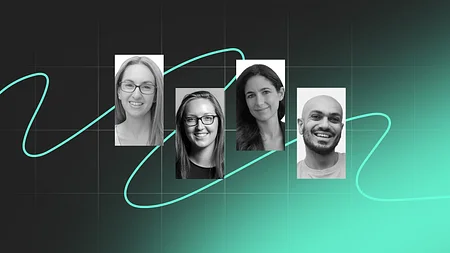Deputy Mayor Rajesh Agrawal Outlines What's Necessary for London’s Fintech Future
Born and raised in a small town in central India, Deputy Mayor for Business in London, Rajesh Agrawal, moved to London in 2001 at 24. He arrived at Heathrow with £200 in his pocket and without knowing a soul.
But he still felt at home in London, citing that feeling as one of the best things about the city. Rajesh set up his own business in international payments before the term fintech even existed and now he’s working to help other fintech entrepreneurs succeed in London.
Listen to our CEO, David M. Brear interview him here or click play below.
When he first set out to start his business, the future Deputy Mayor for Business had almost no money in the bank. Certainly not enough to fund a business and only 6 months left on his visa. He asked for a £10K loan from a bank to start up his business, predictably they said no. Not to be deterred he went back 2 days later and asked for a car loan. The banks was happy to lend him £20K and he used it to fund his new business.
It’s not a strategy he would recommend today due to the high interest cost of that loan and other funding options which are better. But he took that money and created what was one of fastest growing companies in the UK at the time.
The Deputy Mayor's Day to Day
Rajesh Agrawal spends his day advising the mayor around business policy within Greater London. His job is to make sure the mayor hears the concerns and voice of London’s businesses. Rajesh’s influence can be seen in the fallout from Brexit. Six days after the referendum, the mayor was lobbying the government on Brexit negotiations. Making sure London’s business voice is heard in those negotiations. The Deputy Mayor for Business speaks to businesses all day long, big and small, across all sectors. He has 4am meetings in Covent Garden market with fruit and flower wholesalers before heading to the top of glass towers to speak with CEOs. He takes onboard all of their feedback when advising the mayor. He also chairs London and Partners, London’s official promotional agency in charge of bringing foreign investment to London. They promote London worldwide for business, investment and tourism. Rajesh also runs the mayor’s International Business programme that helps fast growing London businesses to internationalise. Rajesh informed us of a number of initiatives from city hall built to support the tech industry, startups and scaleups. They even have their own fund to invest in startups.Fintech Bridges
The Fintech Bridges are a hugely positive thing for the Deputy Mayor. He said that he was all about :“Building bridges not walls, unlike others”. London is a global city and the fintech capital of world with the largest tech ecosystem in europe. He feels it’s only right that the city works with other cities around the world and builds bridges. This should make it easier for entrepreneurs from the UK to work with other countries and entrepreneurs from other countries able to work with UK.“The 21st Century belongs to the cities” - Rajesh AgrawalRajesh believes cities are so agile and nimble they’re like a startup, without the huge burden of foreign policy that countries deal with they can work together a lot more closely.
Importance of London
Rajesh Agrawal explains that for him fintech is the crown jewel of London’s tech industry, its success is built on the natural strength of London, finance. London is the finance and banking capital of the world. There are more American banks in London than there are in New York and more insurance companies than any other city in the world. $1.5 trillion in foreign exchange is traded in London per day, half of the global daily total. Fintech is building on those core strengths and has potential to grow a great deal, it’s only scratched the surface and there’s so much more to achieve.Brexit Brain Drain
London is successful because of its amazing talent. Investors come to London because they’ll be able to find the right talent regardless of industry. City Hall knows it’s important for London to remain open, and it’s why the Deputy Mayor launched the London is Open campaign right after the Brexit referendum. London has benefited significantly from talent across the world. Almost 55% of London’s tech workforce are internationally born. The mayor’s immigration whitepaper made it clear to the government that there’s room for qualified freedom of movement from Europe. London benefits a lot from Europe and needs to remain open. Brexit has its challenges but Rajesh is confident that London will remain the fintech capital of the world. In 2017 there was nearly £3 billion in VC investment in the UK, over half of that was in fintech and 90% was in London. On the Fintech 50 list 31 out of 50 companies are London based and Investment is still growing in the city, so there’s no doubt that London will continue to thrive.The Younger Generation
London is investing significantly in technical skills for young people so they’re equipped for the jobs of today and tomorrow. Entrepreneurship might not be able to be taught but it can be caught according to the Deputy Mayor. An environment of entrepreneurship helps the entire entrepreneur-focused ecosystem. It’s achieved by creating support for startups in funding, networking opportunities and mentoring. These are just some of the initiatives being provided to young people and young entrepreneurs in London.Gender Diversity
“We need to do more, we’ve come some way since but we’ve got a long way to go.” - Rajesh AgrawalThere’s a need to lead by example, the Deputy Mayor is a proud feminist, and so is Mayor Sadiq Khan. The first thing they did when they got into office was commission the gender pay gap enquiry across the GLA (Greater London Authority). The mayor employs 80,000 directly and indirectly, approximately 1.4% of London workforce. Ethnic pay gap audit recently published. Half of the Deputy Mayors are women. 10 women are on the entrepreneurs advisory board, out of 16 members. Rajesh focuses on the need for London to lead by example. He expounds on the need for more female role models. There’s a lack of visibility on great women for little girls in the city on a cultural level. To combat this inequity, and to celebrate her achievements, a statue of Millicent Fawcett was unveiled in Parliament Square. It’s not just statues, the first female commissioner on the police force and the first female fire chief in the history of London have been appointed, showing a commitment to leading by example.


